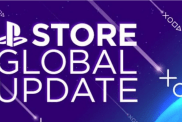
Q: But what about all these free games and freebies journalists get?
Seb: Again, it’s all about transparency. Free stuff can be necessary, but there needs to be a reason and it needs to be open. The reason why PR companies give out free games is that a) it means journalists can get games before release so the review actually helps inform day 1 purchases, and b) it means that the game will get reviewed, despite the ludicrously tight budgets of most game sites that can barely pay their staff, let alone buy every game.
But again, this means that sites begin to rely on PR companies for something, causing them to conform to their wishes, even if not consciously. The fact that Metacritic lists us as a harsher reviewer than the average site doesn’t help our PR relationships, and the logical business decision would be to review higher. But, obviously, that would be wrong.
As for free gifts, again there needs to be a reason. It can’t, or at least shouldn’t, be a big free sword before you write a review of the game. That’s terrible, that’s almost accepting a bribe and runs a strong risk of impacting the impartiality of the review.
However, free stuff for giveaways is, at least in my view, ok, as it’s being passed along to the readers and not a gift for a critic. Yet again, though – and I really need to keep beating this dead horse – the free stuff and its origin needs to be transparent.
FTC guidelines actually insist on this transparency, but it’s sadly not always adhered to.
Dan: Yeah, I have to agree. Journalism in general needs to hold itself accountable for all of the influences we are exposed to and that becomes especially true when it comes to free stuff. Many sites can be flown out to parties that are also ‘all expenses paid’ as well as given a free copy of the game. These events are, in an unspoken way, there to make the potential reviewer more comfortable and leave with a better impression of the title than they would normally have had otherwise. Being transparent is a great way to let the reader know the bias before taking the author’s word to heart, but I think more could be handled in-house before relying on readers to gauge the level of impartiality.
I have yet to be flown anywhere as a part of a promotion, but I have had more than my share of open bars, free food and review copies of games. Has any of this ever truly changed how I reviewed a copy of a game? Luckily I can honestly say I do not believe so. I received a copy of Aliens: Colonial Marines for free, yet reviewed it as a 2.5/10, not because I wanted to appear impartial, but because I was. Being able to segment your thoughts on a game comes from placing your own opinions aside so you can think, “if I had bought this at full price, would it have been a good purchase? And why?”
The understanding that I am a bad representation (as are almost all journalists) of the average gamer, allows most of the bullshit in this industry to be put aside and the heart of a product to take lead. So, can free stuff hurt the industry? Yes, but as I have always said, you need to know your sources as not all sites are equal and determine for yourself how much you can trust them and the information they convey.
Q: Is it a conflict of interest that most sites are financed through paid ads by the companies that they are supposed to review?
Dan: Yes, there can be a level of conflict that can happen when a site is reviewing a game that it is also being paid to advertise. Thankfully, here at PSLS, our ad team is so segregated from us, that I have never even spoken to them. I do not know their names, I do not know where they are even located, and I like it like that. Not all sites have that luxury, and that can be an issue especially when an advertising company pays for a full spread on a site that also scores a game pretty low.
Many of us have already seen the most popular example of this from when Jeff Gerstmann was fired from GameSpot after a less than favorable review of Kane & Lynch: Dead Men, during a time when the publisher had paid for a full site advert. This has led to a great deal of lost credibility to both GameSpot as well as Eidos Interactive, and pushed Gerstmann into the spotlight as an ethical martyr.
Now, given that the whole situation has become a part of this generation’s history, the need for a disconnect is that much more apparent. Moving forward, I think that event has pushed publishers and their ad companies to be less likely to fly off the handle at reviewers, given their public status – just whether that holds true for smaller sites is yet to be seen.
Seb: Gerstmann-Gate was a tragic affair, but luckily its publicity has been a huge step forward for games journalism. Publishers are now too scared to openly apply such pressure to sites in case it blows up in their face and they end up making themselves look bad while causing a journalist to leave GameSpot and gain a ton of credibility, before later being bought out by GameSpot.
Now it’s unlikely that a publisher would threaten to pull ads because of bad reviews, but you have to wonder if they’ll run ads on the site in the future. This tension is incredibly unhealthy for critics, and should be of great concern to readers.
Since becoming Editor-in-Chief, I’ll be honest and say I have now actually learned the names of one or two of the ad people, but only to complain about any ads users don’t like. We don’t talk about what ads are on the site, how much money they make, or anything like that, and I want to keep it that way. I’ve said in the past that, being based in the UK, I have no idea what ads are currently being displayed to our primarily-US audience, and I don’t really care as long as they’re not annoying.
Of course, huge sites like GameSpot can be an issue because they are massive businesses which really care about ad deals, and where publishers particularly care about what they write. This is a dangerous combination, and can lead to questionable reviews.
If you run a small site, you may also worry about how PR companies will react to your content. Don’t. Opinions shouldn’t be for sale.
People are never going to fully trust games sites as long as they run games ads, but that’s good. Readers need to be untrusting and alert to potential abusers of their confidence. Maybe if games journalists realized that quality and ethics were something important to readers we’d actually get some real change.
What do you think of the relationship between press and the games development side of the industry? Can PR reps and developers be trusted? What would you change to make it better? What would you keep? Let us know below in the comments, or by emailing us at DailyReaction@PlayStationLifeStyle.net. You can also send us your free games to Seb and Dan on Twitter.








